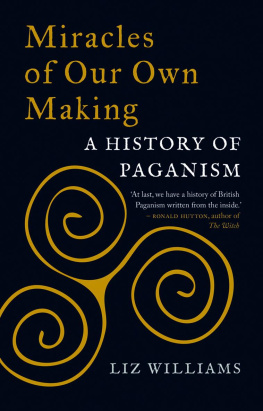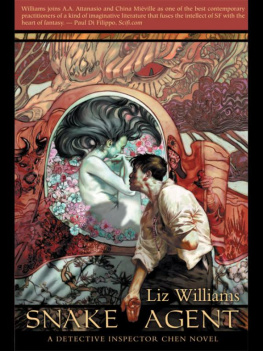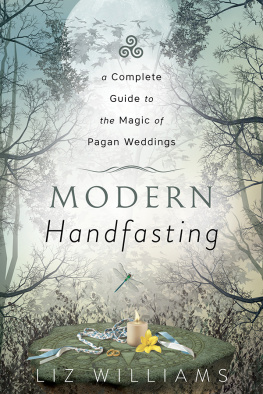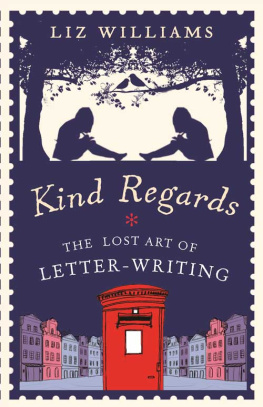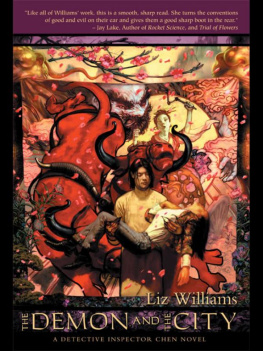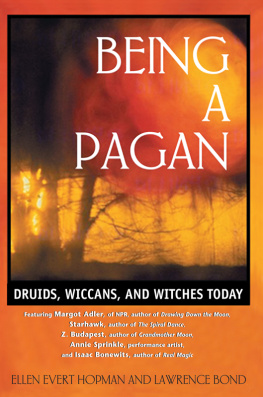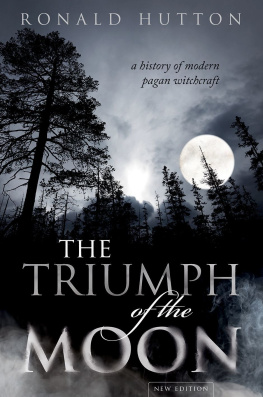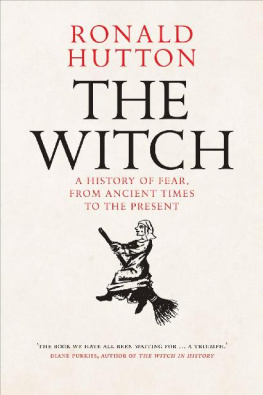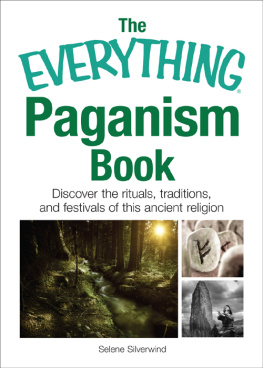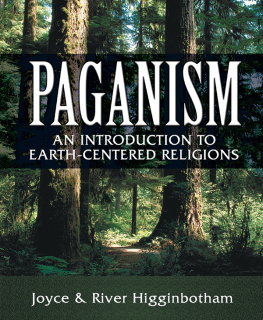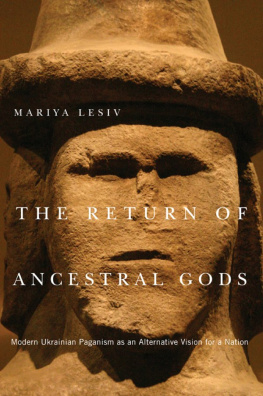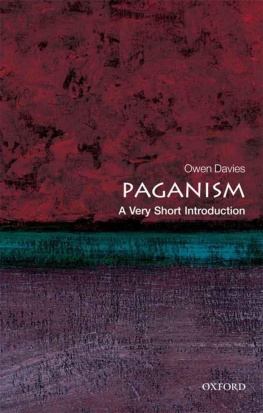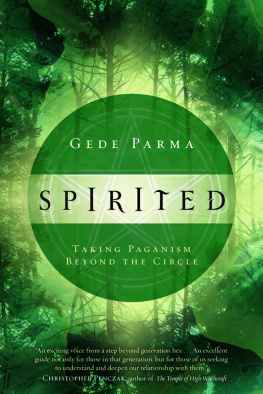Published by
REAKTION BOOKS LTD
Unit 32, Waterside
4448 Wharf Road
London N1 7UX, UK
www.reaktionbooks.co.uk
First published 2020
Copyright Liz Williams 2020
All rights reserved
No part of this publication may be reproduced, stored in a retrieval system, or transmitted, in any form or by any means, electronic, mechanical, photocopying, recording or otherwise, without the prior permission of the publishers
Page references in the Index match the printed edition of this book.
Printed and bound in Great Britain by TJ International, Padstow, Cornwall
A catalogue record for this book is available from the British Library
eISBN 9781789142600
Introduction
W hat do we mean by paganism? The term pagan is often bandied about, with varying claims for its etymology, but it is not always obvious what it refers to and in what kind of context. The word itself comes from the Latin paganus, and is generally held to mean country dweller. But in modern times, in the West, it and more specifically the term neopagan has come to have a different meaning: the range of alternative spiritualities that involve the worship of multiple gods and, often but not invariably, the use of magic. We are thus going to be looking at what a pagan is as defined by the Oxford English Dictionary:
A person holding religious beliefs other than those of the main world religions
And
A member of a modern religious movement which seeks to incorporate beliefs or practices from outside the main world religions, especially nature worship
In this book, however, we are also going to look not only at the history of paganism in the UK, but at the development of magical practice more widely. The dictionary definition of magic states that it is
the power of apparently influencing events by using mysterious or supernatural forces.
Many pagans treat their spirituality as a religion, rather than as a method of dealing with the world. Most pagans believe in science. But many also do believe that magic works, although there may not be a direct relationship between cause and effect. It is perceived as being subtler than that, and is often concerned with personal transformation. We will see that, over time, magic has sometimes been intertwined with pagan beliefs, and sometimes it has been separate. But independently or together, paganism and magic have a continuity of history in Britain and beyond, and we are going to examine the linear development of both.
It is a long history. The human desire to control reality is probably as ancient as we ourselves are, and there is evidence that people have been practising magic from very early times. The oldest burial in Britain the so-called Red Lady of Paviland in South Wales (actually a male), dating from 33000 BC contains grave goods made of mammoth ivory, whose purpose is unclear but which are likely to be of religious significance. Sumerian accounts list magical practices, and we know that the ancient Egyptians, Greeks and Romans practised spells and divination. In Britain and Europe, cunning folk worked among their communities from at least the Middle Ages, and some of the practices they upheld are with us today. We will be looking at these ancient roots throughout this book.
But anybody who is interested in contemporary British paganism and magical practice although over the course of this book we will encounter customs and beliefs from around the world will soon become aware that there are a great many claims about their origins, ranging from the notion of an unbroken underground tradition dating from the time of the ancient Druids, to assertions that our knowledge comes from lost Atlantis, or a matriarchy of Celtic warrior priestesses, or a wide variety of other sources. Disentangling these claims can be an uphill task, for the stories about the roots of this modern spirituality are interwoven with political, religious, cultural and ideological narratives that may tell us more about the time in which they were written (including the present day) than the ancient pagan world.
So where does contemporary paganism originate? Does it really have ancient origins? Or is it a completely modern invention the religious equivalent of historical re-enactment? As far as we can tell, there is some truth in both claims. Modern paganism does have a very old ancestry, but its roots are long, spindly tap roots that may go back quite far but which are not easy to trace and in the UK, at least do not really allow us to claim an unbroken line of descent from the magical theory of 3,0004,000 years ago. Traces of Egyptian magic persist into English medieval magic, but they are only traces, not solid practices that have existed in an unmodified form for thousands of years. The current worship of Celtic gods many of whom werent gods in the first place is largely revivalist, not ancient: much of it goes back to the nineteenth century at the earliest.
Magical practice is clearly ancient. And by the dictionary definition, paganism itself is genuinely very old. However, despite the claims of twentieth- and twenty-first-century practitioners, it is highly unlikely that there are many or perhaps any unbroken traditions of pagan worship, certainly in the UK. Although there are people living today who may indeed have had cunning folk among their ancestors, you should be very wary of anyone of British ancestry who claims to come from an unbroken hereditary tradition. Magical practice of varying kinds has a continuity, but the evidence for strong unbroken systems of pagan belief in this country is simply not there.
Modern Wicca, for example, gained momentum in the 1950s, drawing material from esoteric traditions such as Theosophy and Rosicrucianism, and from Freemasonry. Western neopaganism as a whole draws on folklore, on literature and on the work of groups as diverse as the late nineteenth-century occult society of the Golden Dawn and the Woodcraft Folk. Its origins lie in medieval grimoires and the poetry of William Butler Yeats; in the spiritualism of Madame Blavatsky and the Eastern interests of a former tea planter named Gerald Gardner. We will meet many of these people as we progress through this book. We will look at other traditions and their origins, too, trying to unravel the Ariadnes thread of information and misinformation. Since this is a historical and not a theological work, we shall not be examining in detail the elephant in the room: the question of the veracity of divine or supernatural origins for these beliefs. But that question must nonetheless be kept in mind by the reader.
When we are talking about paganism or magical practice, we need to be cautious about who is making a claim: whether it is in a history book, for example, or in a work of popular fiction, or on the Internet. The last in particular is a minefield, with a multitude of websites and forums generating some extraordinary assertions and drawing on earlier misinformation in order to promote ideological agendas. In this, paganism is in line with pretty much every other religious and political belief system, but this is not much help to the newcomer, who can find the sheer volume of contradictory information bewildering.

